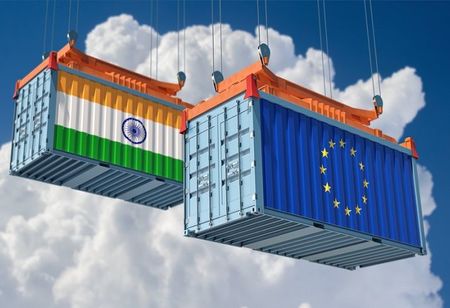
European Union and India agree to enhance bonds in Digital, Energy, Transport and People-to-People Programmes

 Lately, India and the European Union settled to proceed with the accomplishment of the actions set out in the EU-India Roadmap 2025 and foster new synergies to mutually contribute to a safer, greener, cleaner, more digital, flexible, and established world.
Lately, India and the European Union settled to proceed with the accomplishment of the actions set out in the EU-India Roadmap 2025 and foster new synergies to mutually contribute to a safer, greener, cleaner, more digital, flexible, and established world.To advance the joint venture, India and the EU have agreed to work together for a translucent, inclusive and rules-based connectivity between them and together work on regulation and support for private investments in physical infrastructure across all sectors such as digital, transport, energy, and people-to-people programmes. They will discover new opportunities via quality infrastructure, socio-economic benefits from sustainable growth, shared norms, and values.
In the digital sector, both will aim for sturdy and secure connections, submarine cables, satellite networks, 5G connectivity, cross-border payments, and chart to use their own navigation systems like Galileo and NavIC for emergency warning services. The partnership will comprise CITIIS (City Investments to Innovate, Integrate and Sustain) support for accomplishment of India's smart city mission, Varanasi Smart City Project (EFKON), contribution to Indian governmental toolkit (policy, technology, economy) for the deployment of advanced digital network technologies in India and collaboration between the EU and Indian Space Research Organisation.
In the energy sector, both are scheduling for PPPs in EU eco-city projects involving public lighting, waste-to-energy project, rooftop solar facility in Bengaluru, Bhubaneswar, Chennai, Mumbai, and Pune, Italian private investment in Gujarat wind power, Germany's euro 1.7bn investment for 7700km transmission lines, EIB-SBI euro 25m equity for renewable and energy competence and dual research projects on smart grids and storage, and also work with International Solar Alliance.
To enhance affiliation in the transport sector, EU plans investment of euro 3.5bn in railway or metro projects in Lucknow, Bengaluru, Pune, Bhopal, Kanpur, Nagpur; planned metros in Agra, Surat, and Ahmedabad, Italian cooperation with National Infrastructure Investment Fund and possible new air routes for enhanced direct air connectivity among other projects.
In the science and research field, EU and India are aiming at modernization partnership connecting 100 incubators, India-Denmark green partnership, Horizon 2020, promotion of two-way academic mobility among other programmes.
The combined market size of India and the EU is 1.8 billion people and their combined GDP is Euro 16.5 trillion. With Euro 78bn trade in goods in 2019, the EU was India's largest trading partner in 2019 and second-largest export destination.